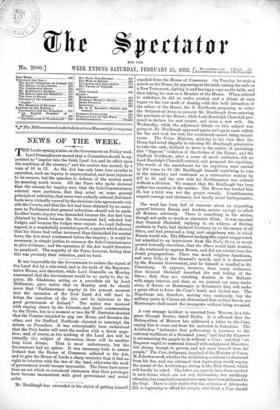Mr. Bradlaugh has succeeded in his object of getting himself
expelled from the House of Commons. On Tuesday he stole a march on the House, by appearing at the table, taking the oath on a New Testament, signing it and leaving a copy on the table, and then taking his seat as a Member of the House. When ordered to withdraw, he did so, under protest, and a debate at once began on the best mode of dealing with this bold infraction of the orders of the House, Sir S. Northcote proposing to order the Serjeant-at-Arms to prevent Mr. Bradlaugh from entering the precincts of the House ; while Lord Randolph Churchill pro- posed to declare his seat vacant, and issue a new writ. On Wednesday, while the adjourned debate on this subject was going on, Mr. Bradlaugh appeared again, and again came within the bar and took his seat, the excitement caused being tumul- tuous. The Prime Minister, sticking to his view that the House had acted illegally in refusing Mr. Bradlaugh permission to take the oath, declined to move in the matter of punishing this "flagrant" violation of the Orders of the House; and Sir Stafford Northcote, after a scene of much confusion, did as Lord Randolph Churchill ordered, and proposed his expulsion. The words of the amendment for his expulsion were carried by 291 votes to 83 (Mr. Bradlaugh himself contriving to vote in the minority), and confirmed as a substantive motion by 297 to 80, and the new writ for Northampton was ordered without a division. We suspect that Mr. Bradlaugh has been rather too cunning in the matter. The House has treated him ill, but a trick was not the proper remedy. Constituencies respect courage and obstinacy, but hardly moral harlequinades.


































